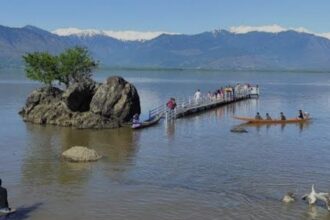The Government of India has successfully evacuated 138 residents from Jammu and Kashmir who were stranded in various conflict-affected countries over the past two years. This announcement was made by Kirti Vardhan Singh, the Minister of State for External Affairs, during a press briefing held on December 6, 2024.
Overview of Evacuation Operations
The evacuations were part of several organized operations aimed at ensuring the safety of Indian nationals caught in crisis situations. The breakdown of these operations is as follows:
- Operation Ganga: Launched in response to the Russian invasion of Ukraine, this operation facilitated the safe return of 128 individuals from the war-torn country. The operation was initiated in February 2022 and involved multiple flights organized by the Indian government to bring back stranded citizens amidst escalating violence and humanitarian crises.
- Operation Ajay: This operation was specifically designed to assist those stranded in Israel amid rising tensions and conflict. A total of nine residents from Jammu and Kashmir were evacuated under this initiative, which highlighted the government’s swift response to emerging threats to Indian citizens abroad.
- Operation Kaveri: Conducted in response to the civil unrest in Sudan, this operation resulted in the evacuation of one individual from Jammu and Kashmir. The operation was part of a broader effort to assist Indian nationals during the violent upheaval that affected many foreign nationals.
Government Commitment to Safety
Minister Kirti Vardhan Singh emphasized that the Indian government accords the highest priority to the safety, security, and well-being of its citizens abroad. The government has implemented several measures to ensure effective evacuations:
- Diplomatic Coordination: The Ministry of External Affairs maintains constant communication with foreign governments and international organizations through diplomatic channels. This collaboration is crucial for securing safe passage for Indian nationals during emergencies.
- Local Volunteer Engagement: In addition to official resources, local volunteers from the Indian community are often engaged to provide logistical support during evacuations. These volunteers play a vital role in assisting stranded individuals, offering guidance, and ensuring smooth transit.
- 24/7 Control Rooms: To facilitate these operations, the government has established control rooms that operate round-the-clock both at headquarters in India and at embassies or consulates abroad. These control rooms are tasked with coordinating evacuation efforts, providing real-time updates, and addressing any challenges that may arise during the process.
Broader Implications
These evacuation efforts underscore India’s commitment to protecting its citizens in times of crisis. The proactive approach taken by the government reflects a broader strategy in crisis management and humanitarian assistance. By swiftly responding to international emergencies, India not only safeguards its nationals but also reinforces its diplomatic relations with other countries.
As global conflicts continue to pose risks to citizens abroad, the Indian government’s ability to execute such operations effectively will remain crucial. The successful evacuation of residents from Jammu and Kashmir highlights a well-coordinated effort that prioritizes human safety and reflects India’s dedication to its people worldwide.







